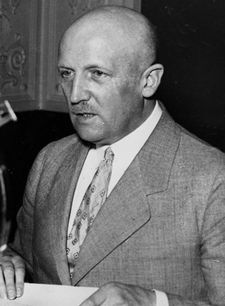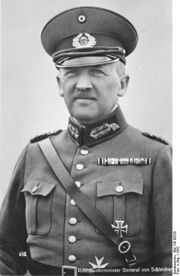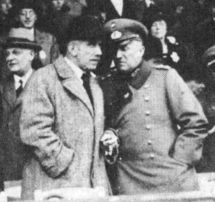Kurt von Schleicher
| Kurt von Schleicher | |
 |
|
|
|
|
|---|---|
| In office 3 December 1932 – 28 January 1933 |
|
| President | Paul von Hindenburg |
| Deputy | Vacant |
| Preceded by | Franz von Papen |
| Succeeded by | Adolf Hitler |
|
Minister President of Prussia
(Reichskomissar) |
|
| In office 3 December 1932 – 28 January 1933 |
|
| Preceded by | Franz von Papen |
| Succeeded by | Franz von Papen |
|
Reich Minister of Defense
|
|
| In office 1 June 1932 – 28 January 1933 |
|
| President | Paul von Hindenburg |
| Chancellor | Franz von Papen (1932) Himself (1932-1933) |
| Preceded by | Wilhelm Groener |
| Succeeded by | Ferdinand von Bredow |
|
|
|
| Born | 7 April 1882 Brandenburg an der Havel, Germany |
| Died | 30 June 1934 (aged 52) Potsdam-Babelsberg, Germany |
| Political party | None |
| Occupation | Soldier (General) |
Kurt von Schleicher (7 April 1882 – 30 June 1934) was a German general and the last Chancellor of Germany during the era of the Weimar Republic.
Contents |
Biography
Schleicher was born in Brandenburg an der Havel, the son of a Prussian officer and a shipowner's daughter. He entered the German Army in 1900 as a second lieutenant after graduating from a cadet training school. In his early years, Schleicher made two friendships which later were to play an important role in his life. As a cadet, Schleicher befriended Franz von Papen, and later on as an officer in the Third Guards Regiment befriended Oskar von Hindenburg. During World War I he served on the staff of Wilhelm Groener, who became Schleicher's patron.
Army service after World War I

After Schleicher's army career, during the 1920s, he moved up steadily in the Reichswehr, the German army, becoming the primary liaison between the army and civilian government officials. He generally preferred to operate behind the scenes, planting stories in friendly newspapers and relying on a casual network of informers to find out what other government departments were planning. In this capacity, he headed up the Ministeramt or Office of the Ministerial Affairs. Although essentially a Prussian authoritarian in his views on order, discipline and the so-called decadence of the Weimar era, Schleicher also believed that the Army had a social function, that of an institution unifying the diverse elements in society. Interestingly, he was also opposed to policies such as Eastern Aid (Osthilfe) for the bankrupt East Elbian estates of his fellow Junkers. In economic policy, therefore, he was a relative moderate.
Schleicher became a major figure behind the scenes in the presidential cabinet government of Heinrich Brüning between 1930 and 1932, serving as an aide to General Wilhelm Groener, the Minister of Defence. Eventually, Schleicher, who established a close relationship with President Paul von Hindenburg, came into conflict with Brüning and Groener, and his intrigues were largely responsible for their fall in May 1932. By coincidence, his name translated from the German is "Sneaker" or "Creeper."
The new Chancellor, Franz von Papen, hand-picked Schleicher as Minister of Defence. Schleicher was not as conservative as Papen, however, as evidenced in a 1932 radio address in which he bluntly announced his unambiguous opposition to either a military dictatorship or a puppet regime to be backed by military force. Eventually, Papen and Schleicher came into conflict, and when, following the November 1932 elections, the government could not maintain a working parliamentary majority, Papen was forced to resign, and Schleicher succeeded him as Chancellor of Germany.
Chancellorship

Schleicher hoped to attain a majority in the Reichstag by forming a so-called Querfront, meaning "cross-front," whereby he would unify Germany's fractious special interests around a non-parliamentary, authoritarian but participatory regime. Thus, he reached out to the Social Democratic labour unions, the Christian labour unions and the more moderate branch of the Nazi Party, led by Gregor Strasser; Strasser, however, was already losing the internal power struggle with Hitler.
Although Schleicher made some initial progress, he was rebuffed by both sides. Schleicher also suffered from a severe loss in public popularity, when it was revealed he had been having an affair with Walther Stennes. Meanwhile, the ousted Papen now had Hindenburg's ear, because the latter was beginning to have misgivings about Schleicher's "cryptoparliamentarianism" and willingness to work with the SPD, which the old President despised. Papen was urging the aged President to appoint Hitler as Chancellor in a coalition with the Nationalist DNVP, or Deutschenationale Volkspartei (German National People's Party) who, together with Papen, would supposedly be in a position to moderate Nazi excesses. Unbeknownst to Schleicher, Papen was holding secret meetings with both Hitler and Hindenburg, who then refused Schleicher's request for emergency powers and another dissolution of the Reichstag. The President dismissed Schleicher, calling Hitler into power on 30 January 1933. In the following months, the Nazis issued the Reichstag Fire Decree and the Enabling Act, transforming Germany into a totalitarian dictatorship.
Assassination
In his last months, Schleicher was instrumental in attempts to negotiate the return of the House of Hohenzollern. Fearing this would lead to his overthrow and the collapse of his regime, Hitler had considered Schleicher a target for assassination for some time. When, on 30 June 1934, the Night of the Long Knives occurred, Schleicher was one of the chief victims. While in his house, he was gunned down; hearing the shots, his wife came into the room, whereupon she was also shot. His stepdaughter was the one who found the bodies. In his speech to the Reichstag on July 13 justifying his actions, Hitler denounced Schleicher for conspiring with Ernst Röhm to overthrow the government.
Schleicher's Cabinet, December 1932 - January 1933
- Kurt von Schleicher - Chancellor and Minister of Defense
- Konstantin Freiherr von Neurath - Minister of Foreign Affairs
- Franz Bracht - Minister of the Interior
- Lutz Graf Schwerin von Krosigk - Minister of Finance
- Hermann Warmbold - Minister of Economics
- Friedrich Syrup - Minister of Labour
- Franz Gürtner (DNVP) - Minister of Justice
- Paul Freiherr Eltz von Rübenach - Minister of Posts and Transport
- Magnus Freiherr von Braun (DNVP) - Minister of Food
- Günther Gereke - Reichskomissar for Employment
- Johannes Popitz - Minister without Portfolio
See also
 Media related to Kurt von Schleicher at Wikimedia Commons
Media related to Kurt von Schleicher at Wikimedia Commons
References
- Bracher, Karl Dietrich Die Aufloesung der Weimarer Republik; eine Studie zum Problem des Machtverfalls in der Demokratie Villingen: Schwarzwald, Ring-Verlag, 1971.
- Eschenburg, Theodor "The Role of the Personality in the Crisis of the Weimar Republic: Hindenburg, Brüning, Groener, Schleicher" pages 3-50 from Republic to Reich The Making Of The Nazi Revolution edited by Hajo Holborn, New York: Pantheon Books, 1972.
- Turner, Henry Ashby Hitler's thirty days to power : January 1933, Reading, Mass. : Addison-Wesley, 1996.
- Wheeler-Bennett, Sir John The Nemesis of Power: German Army in Politics, 1918 - 1945 New York: Palgrave Macmillan Publishing Company, 2005.
- Hayes, Peter ""A Question Mark with Epaulettes"? Kurt von Schleicher and Weimar Politics" pages 35-65 from The Journal of Modern History, Volume 52, Issue #1, March 1980.
| Political offices | ||
|---|---|---|
| Preceded by Wilhelm Groener |
Minister of Defence 1932 |
Succeeded by Werner von Blomberg |
| Preceded by Franz von Papen |
Chancellor of Germany 1932 |
Succeeded by Adolf Hitler |
| Prime Minister of Prussia 1932 – 1933 |
Succeeded by Franz von Papen |
|
|
||||||||||||||
|
||||||||||||||